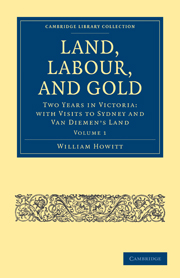Summary
M'Ivor Diggings, June 30th, 1853.
In perambulating these diggings, we find them very various in the depth of sinking and in yield. The central parts near and behind the Commissioners' camp are reported to have been the richest, and these parts are the deepest, from thirty to forty feet. The richest of all, Golden Gulley, in that quarter, it is said, was discovered by a lad, the son of a blacksmith, as he was delving and making a sham, boy's digging—playing, in fact, at digging,—but carrying gold in considerable quantities to his father, the blacksmith set to work in good earnest, and there was very soon a rush there. Since then, the digging has extended in this direction, that is, towards the Melbourne side; and Californian Gully, German Gully, Caledonian Gully, mere hollows, scarcely below the ordinary level of the ground, are being dug up with very partial success. In and along the creek others are digging, but they are all complaining, and say, “Oh! these are only sham diggings.” In the direction of the ranges, the granite rocks assume some of the oddest and most grotesque shapes that I have seen in this colony. They rise in some places abruptly out of the ground, and stand in long ridges, some like sugar-loaves, others like pyramids, and others very much resemble the rocking-stones of Derbyshire and Cornwall.
- Type
- Chapter
- Information
- Land, Labour, and GoldTwo Years in Victoria: with Visits to Sydney and Van Diemen's Land, pp. 336 - 353Publisher: Cambridge University PressPrint publication year: 2011First published in: 1855



